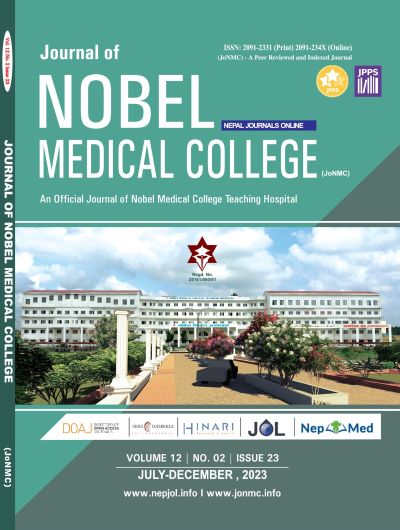Impact of Tailored Intensive Rehabilitation on Functional Independence and Quality of Life in Brain Tumor Patients: A Prospective Observational Study
DOI:
https://doi.org/10.3126/jonmc.v12i2.61349Keywords:
Brain tumor, Glioma, Intensive rehabilitation therapy, Meningioma, Quality of lifeAbstract
Background: Brain tumors are a heterogeneous group causing disability. They significantly impact functional independence and quality of life. This study aims to investigate how tailored intensive rehabilitation affects brain tumor patients using the functional independency measure score.
Materials and Methods: This is a prospective observational correctional study conducted in the department of Neurophysiotherapy and Neurosurgery at Nobel Medical College Teaching Hospital, Biratnagar over a period of 18 months. A total of 96 brain tumor patients who underwent surgery at a tertiary care centerduring the study period were included. Along with the demographic data, the diagnosis ofbrain tumor functional independency was assessed using the Functional Independence Measure Index.
Results: A total of 96 brain tumor patients (44 males, 52 females, average age 55.6 years) were studied. The tumors' distribution showed variations, with glial tumors being the most frequent (36.4%). The Functional Independence Measure (FIM) Index was used to assess functional independence, yielding an average score of 82.5. Patients with meningioma had higher FIM scores (84.3) compared to glial cell tumor patients (80.1), although not statistically significant (p = 0.122).The study also explored correlations between FIM scores, hospital stay duration (average 9 days), and patient satisfaction. A weak positive correlation (r = 0.25) existed between FIM scores and hospital stay duration.A moderate positive correlation (r = 0.65) was found between FIM scores and patient satisfaction, suggesting higher satisfaction among patients with better functional independence.
Conclusion: Intensive rehabilitation therapy shows promise in improving functional independence in brain tumor patients.
Downloads
Downloads
Published
How to Cite
Issue
Section
License
Copyright (c) 2023 Narendera Prashad Joshi, Prakash Kafle, Babita Khanal, Dipak Yadav, Pramod Kumar Chaudhary, Marvin Dewan

This work is licensed under a Creative Commons Attribution 4.0 International License.
JoNMC applies the Creative Commons Attribution (CC BY) license to works we publish. Under this license, authors retain ownership of the copyright for their content, but they allow anyone to download, reuse, reprint, modify, distribute and/or copy the content as long as the original authors and source are cited.




